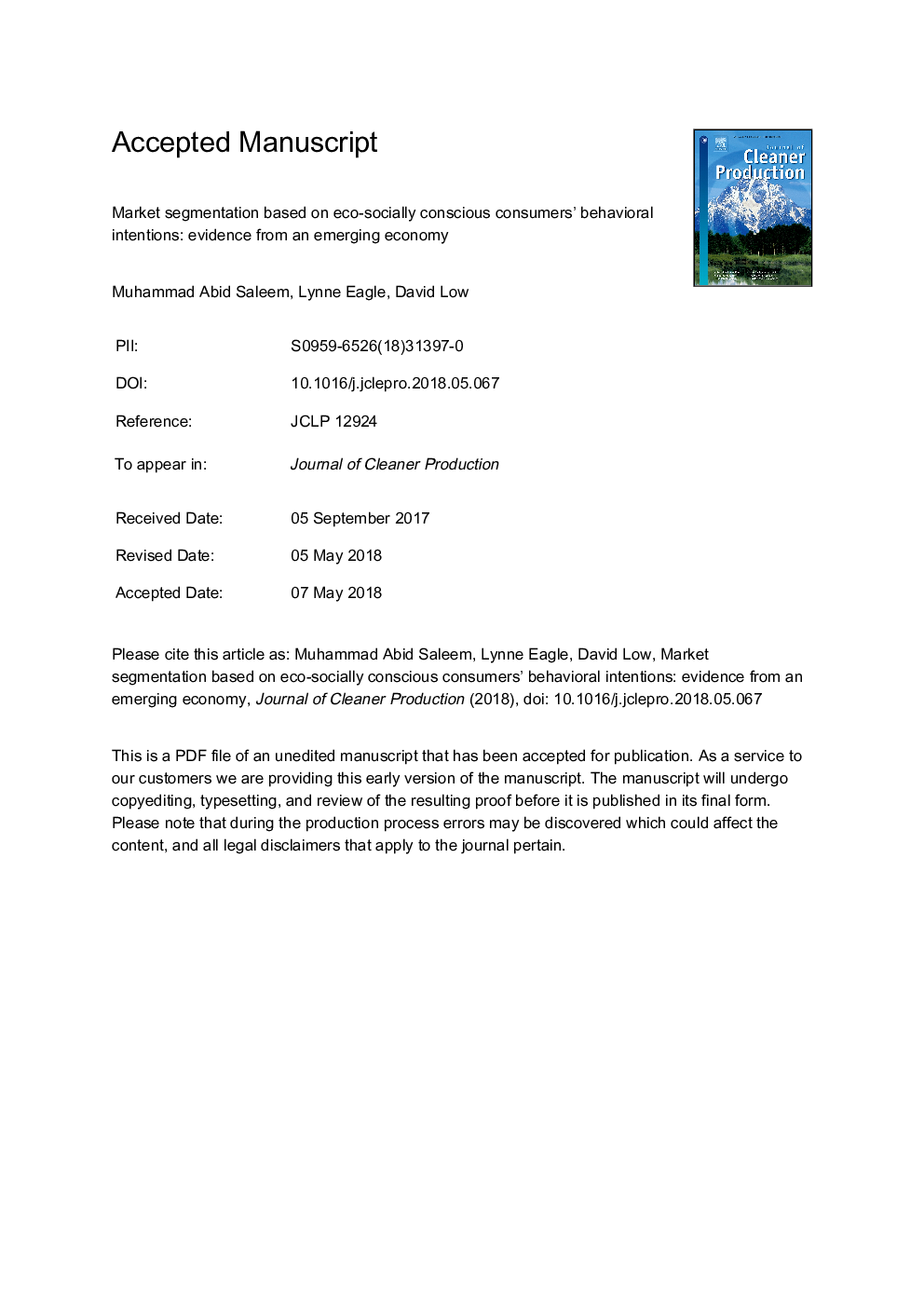| کد مقاله | کد نشریه | سال انتشار | مقاله انگلیسی | نسخه تمام متن |
|---|---|---|---|---|
| 8094331 | 1522060 | 2018 | 37 صفحه PDF | دانلود رایگان |
عنوان انگلیسی مقاله ISI
Market segmentation based on eco-socially conscious consumers' behavioral intentions: Evidence from an emerging economy
ترجمه فارسی عنوان
تقسیم بندی بازار بر اساس خواسته های رفتاری مصرف کنندگان آگاهانه اجتماعی و اجتماعی: شواهد از یک اقتصاد نوظهور
دانلود مقاله + سفارش ترجمه
دانلود مقاله ISI انگلیسی
رایگان برای ایرانیان
کلمات کلیدی
ترجمه چکیده
با وجود اهمیت رو به رشد مشکلات زیست محیطی در اقتصادهای در حال ظهور، برای سیاست گذاران در مورد ویژگی های مصرف کنندگان در رابطه با محیط زیست، اطلاعات محدودی در دسترس است. هدف از این مطالعه ارائه تجزیه و تحلیل عوامل اجتماعی-جمعیت شناختی و روانشناختی است که مصرف کنندگان سبز را از مصرف کنندگان غیر سبز تبعیت می کند، در راستای اهداف رفتاری مصرف کنندگان آگاهی اجتماعی و اجتماعی به ویژه در مورد انتخاب و استفاده از ماشین های شخصی. این مطالعه بینش جدیدی را از یک تحقیق تجربی انجام داده که نمونه ای از 771 مشتری صنعت خودرو را در یک بازار رو به رشد در آسیای جنوبی، یعنی پاکستان، ارائه می دهد. یافته ها از تجزیه و تحلیل خوشه سلسله مراتبی، استفاده شده به یک نمونه به طور تصادفی انتخاب ملی، نشان داد که کمی بیش از 50٪ از مشتریان دارای تمایلات اجتماعی و اجتماعی نسبت به انتخاب و استفاده از اتومبیل شخصی. تجزیه و تحلیل چند معنی دار نشان داد که معنویت، اثربخشی درک شده مصرف کننده و ارزش های محیطی، عوامل مؤثر بر تمایز بین سه بخش است: محافظه کاران، بی تفاوت و علاقه مندان. علاوه بر این، مصرف کنندگان در بخش علاقه مندان علاقه ای به حفاظت از محیط زیست از طریق استفاده از اتومبیل های شخصی نشان نمی دهند. تجزیه و تحلیل خصوصیات جمعیت شناختی نشان داد که مشتریان این سه بخش بر اساس درآمد، تحصیلات، جنسیت و محل اقامت از یکدیگر به طور قابل توجهی متفاوت بودند. یافته های این تحقیق، رهنمودهای مهم را برای بازاریابان و سیاست گذاران ارائه می دهد که به دنبال ایجاد استراتژی های قابل اجرا برای رسیدگی به نیازهای خاص بخش خصوصی محیط زیست در بازار پاکستان هستند.
موضوعات مرتبط
مهندسی و علوم پایه
مهندسی انرژی
انرژی های تجدید پذیر، توسعه پایدار و محیط زیست
چکیده انگلیسی
Despite the growing importance of environmental problems in emerging economies, only limited information has been available for policymakers regarding consumers' characteristics with regards to pro-environmental orientation. The purpose of this study is to provide an analysis of the socio-demographic and psychographic factors that discriminate green consumers from non-green consumers, in the context of eco-socially conscious consumers' behavioral intentions specific to choice and use of personal cars. This study offers novel insights from an empirical investigation conducted with a sample of 771 automobile industry customers in a growing market within South Asia, i.e., Pakistan. Findings from hierarchical cluster analytics, applied to a randomly selected national sample, revealed that slightly over 50% of the customers had eco-social tendencies towards the choice and use of personal cars. Multiple Discriminant Analysis showed that spirituality, perceived consumer effectiveness and environmental values were significantly discriminating factors between the three segments: Conservatives, Indifferents, and Enthusiasts. Moreover, consumers in the enthusiasts' segment showed growing interest in eco-social conservation via the use of personal cars. Analysis of demographic characteristics demonstrated that customers of the three segments differed significantly from each other based on income, education, gender and city of residence. Findings of the study provide important guidelines for marketers and policymakers seeking to develop actionable strategies for addressing the specific needs of the pro-environmental segment in the Pakistani market.
ناشر
Database: Elsevier - ScienceDirect (ساینس دایرکت)
Journal: Journal of Cleaner Production - Volume 193, 20 August 2018, Pages 14-27
Journal: Journal of Cleaner Production - Volume 193, 20 August 2018, Pages 14-27
نویسندگان
Muhammad Abid Saleem, Lynne Eagle, David Low,
